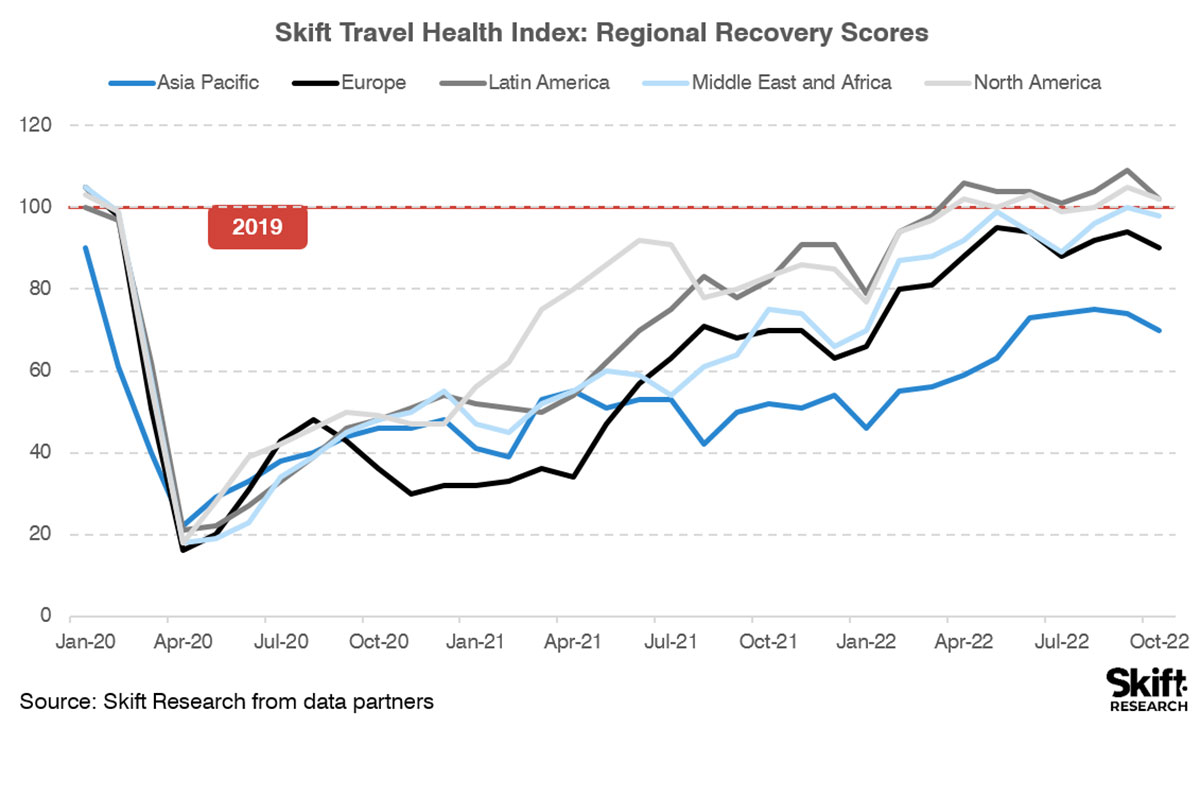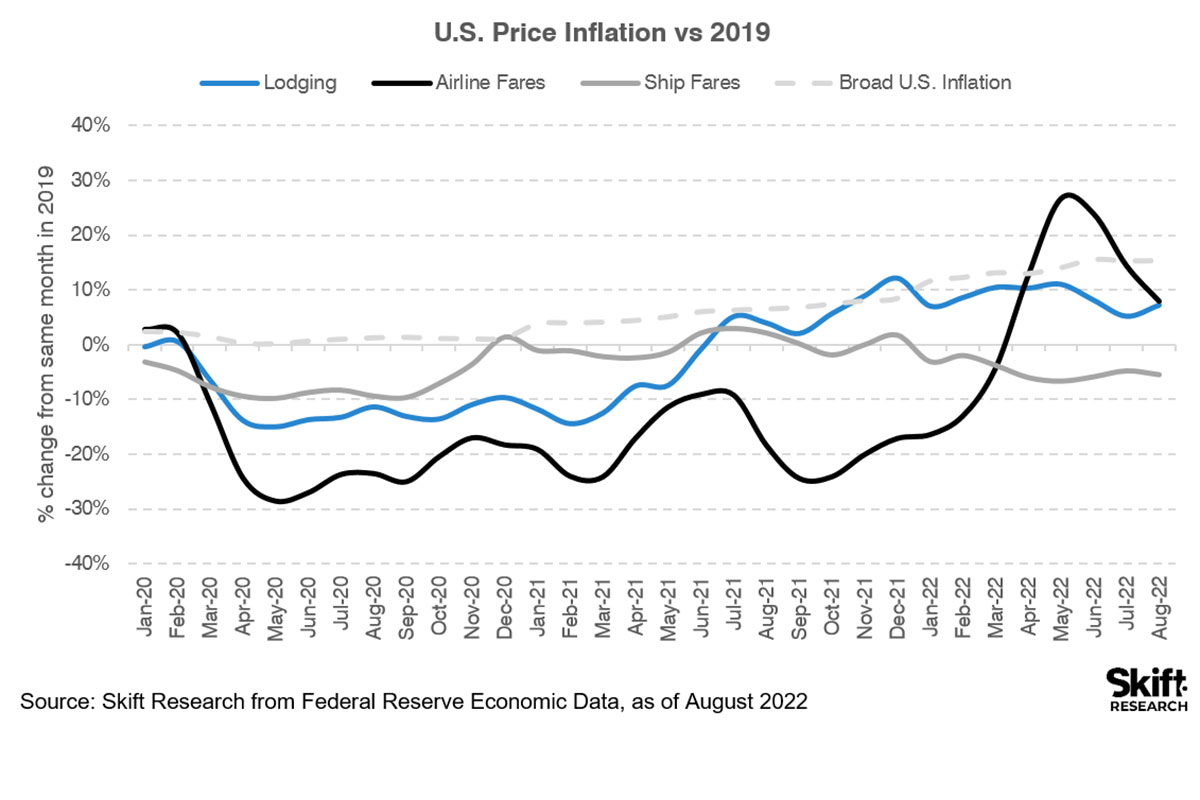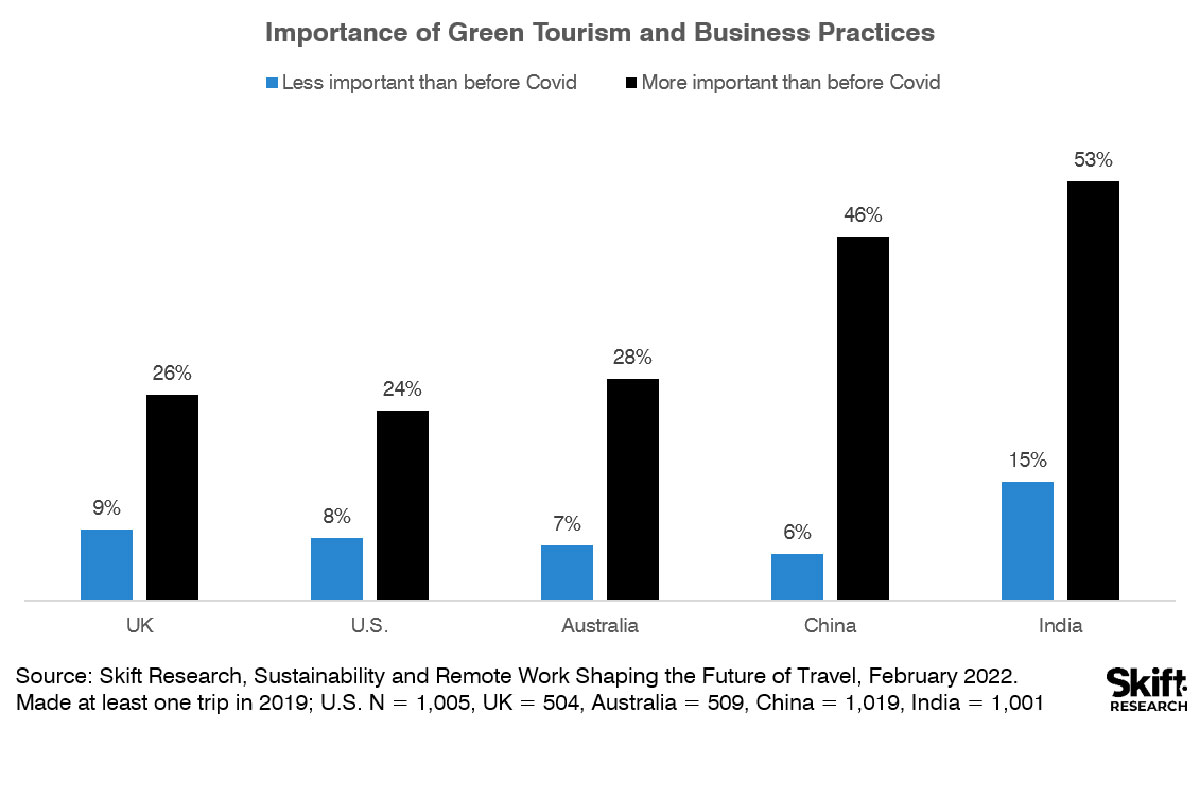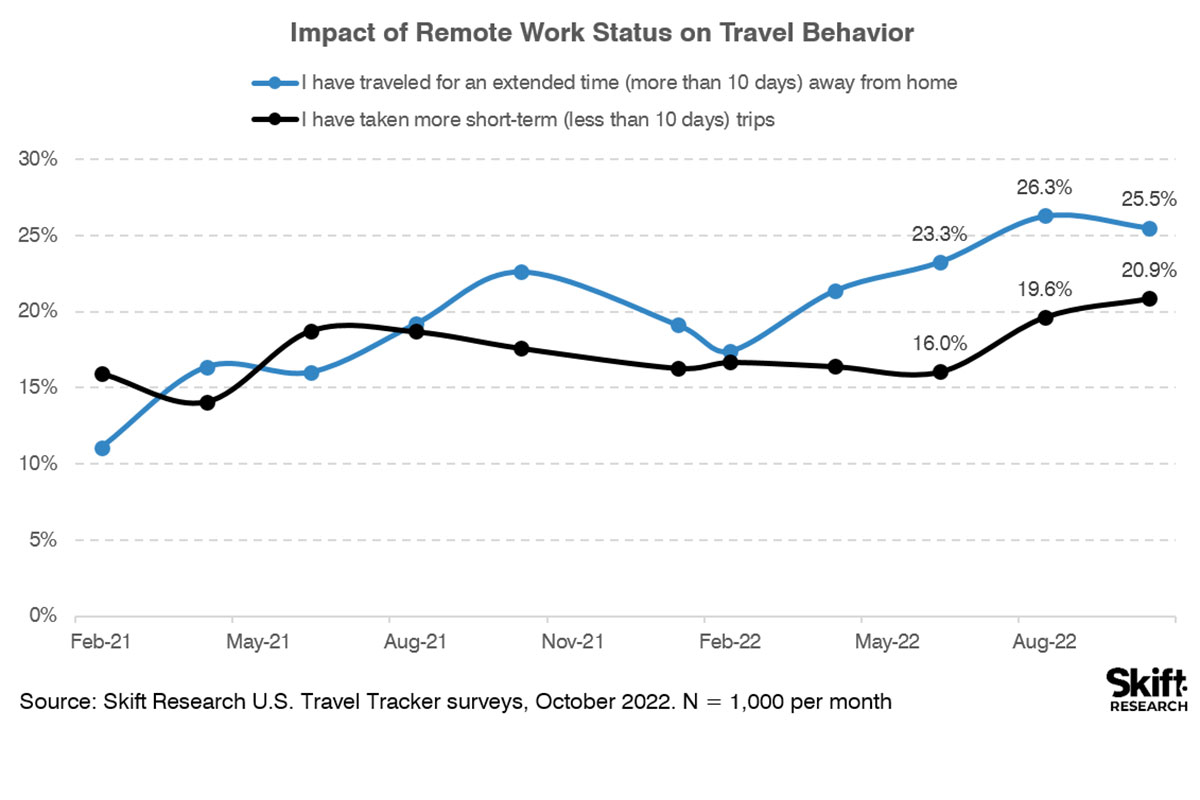We ask our reporters and editors at the end of every year to stretch their imaginations for what could unfold in the new year. Give us bold predictions you know are 90 percent unlikely, but ones that provoke some thought. And who knows? Each might carry some half-truths once you dig into our team’s analyses.
Indulge us, and give these predictions a read.
Marriott Will Buy Rosewood
Sean O’Neill, Senior Hospitality Editor
I see our annual predictions as a mental exercise to remind myself and others that unlikely events, such as pandemics, global financial crises, and mega-mergers among hotel companies, can happen. Last year, I “predicted” Marriott would launch a TV channel, streaming or otherwise. Instead, Marriott made a smaller industry-first move. Marriott began a project to create an ad network, letting non-travel advertisers use its sites, apps, and in-room TVs to advertise to its audience of guests. The ad network has the same underlying commercial motivation as creating a TV channel but is less risky.
This year, I predict that Marriott will buy Rosewood Hotels & Resorts, a chain of luxury properties. I profiled Rosewood this month and noted that it is currently owned by a billionaire family in China via parent conglomerate New World. New World has said it may seek asset disposals in its non-core businesses. Will it decide its hotel business unit, a minority revenue generator, is non-core? The conglomerate seemed to tell investors this year that it sees its core businesses as roads (such as private tolls), aviation (such as aircraft leasing), construction, and insurance, according to a J.P. Morgan report.
One caveat: Rosewood CEO Sonia Cheng was raised in the family’s hotel apartments in Hong Kong and has spent more than a decade expanding the Rosewood empire. It’s hard to imagine her giving it up. So my bold prediction includes a bet that Sonia Cheng would join Marriott as a leader.
Marriott could benefit from having Rosewood’s higher-end customers and urban luxury footprint along with Cheng’s expertise. True, the deal would bring a few owned properties, which would reverse Marriott’s path toward becoming more asset-light. But Marriott CEO Anthony Capuano hinted on-stage at Skift Global Forum that his company would still consider acquisitions even if they temporarily increased its owned footprint.
Alaska Airlines Will Buy Hawaiian Airlines
Jay Shabat, Senior Analyst at Airline Weekly
What should an Eskimo do when he gets cold? Consider Hawaii.
The Hawaiian airline market, to be clear, isn’t always hot. Hawaiian Airlines, after all, was a bankrupt company at one time. But that was a long time ago. The fact is, Hawaii’s largest airline performed exceptionally well throughout the 2010s, thanks to strong demand, good execution, and smart fleet, product, and network decisions. Now, with the pandemic travel depression in the rearview mirror, leisure travel is where the action is. And leisure travel is the backbone of Hawaiian’s business.
Even so, the airline’s stock price is down roughly 70 percent from its levels just prior to the pandemic. A bargain takeover target?
The U.S. Big Three wouldn’t mind having some more Hawaiian exposure. Don’t think of the market as a Pacific version of Florida. Yields are much higher. LCCs are put off by the long stage lengths. And the Hawaii originating outbound market is bigger than you’d guess (the U.S. military alone generates a lot of outbound demand; it’s the largest employer in Honolulu). But alas, the U.S. Big Three probably want to focus on repaying debt right now. So let’s cross Delta, American, and United off the list.
How about Southwest? It sure would be nice to dominate the Hawaiian market, one that it only recently entered. The state is increasingly important not just to its flight network but also its loyalty plan and associated credit card relationship with JPMorgan Chase (a super-lucrative relationship, make no mistake). But does Southwest really want to be flying widebodies to Japan? Probably not. Not something Herb would have done.
Which brings us to Alaska Airlines. The decade leading up to the pandemic was a magical one for the Eskimo-themed airline. Profit margins were world class. Now, things are picking up right where they left off (Q3 operating margin topped 15 percent, far and away the highest among U.S. airlines). Alaska today has one of the balance sheets in the business. What it also has, however, is a one-trick pony problem. Sort of. Though not totally reliant on Seattle for its profits, the Emerald City is the center of its solar system. The problem is, Seattle’s airport is running out of room to grow. Buying Virgin America almost two decades ago (wow, has it been that long?) gave Alaska some useful California and transcon diversification. But California, in particular, has been a tough slog. Now, with the tech sector encountering a downturn, west coast economies including Seattle stand to suffer.
Admittedly, the long tech boom has helped lift the Hawaiian market (Silicon Valley millionaires need to vacation somewhere). But Hawaiian tourism held up relatively well during even the nasty 2008-09 recession. Does Alaska Airlines really want to fly Airbus A330s and add an order book of Dreamliners? Well, it’s already dipped its toe into the complexities of intercontinental travel by joining the oneworld alliance. That’s nothing if not an indication that it’s looking for growth as its Seattle infrastructure constraints loom. More Hawaii will help its loyalty plan and critical Bank of America relationship. It’s a nice winter market to balance summertime tourism to Alaska.
Maybe the Eskimo could use some more sunshine.
Event Agencies Falter as Mid-Sized Meetings Vanish
Miguel Neves, Editor-in-Chief at Skift Meetings
The past year was a year of recovery for the meetings industry. Small meetings are back on track, despite business travel recovery lagging significantly behind leisure travel. With remote workforces likely to boost the number of retreats and regular in-person gatherings, the future seems bright for this type of meetings.
Significant iconic business events such as Web Summit, C2 Montreal, SXSW, Dreamforce, and many others held their first full-capacity edition since 2019. In addition, meetings industry shows like IMEX America and ITBM World returned and attracted a similar number of attendees compared to the 2019 editions. As a result, while there are concerns about the outlook for trade shows in 2023, most shows will remain feasible.
I hope I am wrong, but mid-sized meetings will struggle.
As corporate budgets tighten, mid-sized meetings (between 200 and 2,000 participants) will likely take the brunt of the travel reductions. Small meetings provide essential opportunities for connecting with colleagues or business interests. Large conventions and business events are labeled “can’t miss” events where attendees join because “everyone is there.”
A significant reduction in mid-sized meetings is not just bad news for the companies and associations that organize them. These meetings are the lifeblood of agencies that make the bulk of their revenue from hotel commissions.
Without mid-sized meetings, the agencies that rely on them will have to significantly change their business model and diversify their source of revenue. If the agency pivots during the Covid pandemic are anything to go by, this will cause a significant disruption that will leave permanent scars.
Airline Consolidation Moves Ahead Even Amid Stumbles
Edward Russell, Editor, Airline Weekly
Last year we talked about airline consolidation in abstract: The bidding war for Spirit Airlines, deal making in South America, and many potential combinations in Europe. Now, 2023 will be the year when things start happening. JetBlue and Spirit will get a nod from the U.S. Justice Department to move forward with their merger, but the former will have to choose between Spirit or its (lucrative) alliance with American Airlines. Avianca, Gol, and Viva Air will merge, barely avoiding the closure of Viva in the process. And in Europe, Air France-KLM will get TAP Air Portugal, International Airlines Group gets Air Europa, and the Lufthansa Group gets ITA Airways.
But closing an airline merger is only the first step. Every one of the aforementioned carriers will face unexpected costs and challenges implementing their combinations, exacerbating the cost inflation the industry is already experiencing. The operational meltdowns — remember the United-Continental integration debacle in 2012? — are saved for later years.
Trip.com Group Will Acquire an Online Travel Agency in The Middle East
Peden Doma Bhutia, Asia Editor
One of the biggest online travel agencies in the world, Trip.com Group has great aspirations in the Middle East. At the Skift Global Forum East in Dubai this month, chief operating officer Schubert Lou spoke about how lucrative a market the region is for the group.
The company knows better than to rely on the China market. Its first quarter results this year clearly indicate how Trip.com Group’s global platforms outside China, both of which have been acquisitions — Scotland-based Skyscanner and Trip.com — were bright spots following challenges in the Chinese domestic travel market.
With the group banking on international growth as a key driver of its business, the Middle East is an attractive market. The company decided to enter the region in spite of the fact that Trip.com-backed online travel agency MakeMyTrip had announced its foray into the United Arab Emirates in 2020.
Acquiring an established company would help the group gain a stronger foothold in a region that is set to be key driver for global travel recovery. The online travel agency has said that it would continue to boost the destinations’ growth through ever-increasing partnerships in the region and is looking forward to see how travel to the region will flourish. Considering it has been five years since the company’s last acquisition, 2023 might just be the year to go shopping!
Africa’s Fragmented Tourism Industry Assembles
Matthew Parsons, Corporate Travel Editor
In 2023, Africa’s tourism industry gets it together. Or at least it takes giant strides towards some kind of much-needed unification, and especially improved airline route networks.
Willingness is there, thanks to the Single African Air Transport Market initiative that’s being pushed by the International Air Transport Association. Open skies will make a big difference, and spur Africa on.
Certain destinations in Africa are also heavily reliant on tourism, and will have suffered from a lack of tourist dollars over the past two years. Leaders won’t want to miss out on travel’s resurgence, particularly with blended travel. A vast continent, Africa lends itself to longer stays because of the distances between destinations, and at times slower transport options.
Let’s also not forget U.S. intent. JetBlue is eyeing Africa, thanks to new Airbus XLR aircraft. “It’s not on the radar right now, but I hope to see it happen some day,” Joanna Geraghty, the airline’s president and chief operating officer, teased to Skift in September.
West Africa will prove an interesting access point. As well as the region’s technology hubs, there’s a new highway planned between Nigeria and the Ivory Coast. Further north is another access point, Morocco, increasingly appealing to Europe’s tourists and digital nomads alike, and a country already capturing the imagination of the major hotel groups.
While the Middle East stole the limelight in 2022, next year could well be Africa’s turn.
Airbnb Will Launch a Short-Form Video Offering as Part of Its Experiences Revamp
Selene Brophy, Travel Experiences Business Reporter
Social platforms are pushing short-form video content to users more than ever before. For example, reels via Facebook and Instagram and shorts via YouTube are being prioritized. TikTok specifically has had a significant impact on travel marketing spend, and has reportedly taken a chunk from search giant Google.
However, the short-form video platform’s acceleration as a marketing tool for travel has hit a speed bump. TikTok’s proliferation and cyber security risk to the U.S. are at the center of a bipartisan bill introduced to congress recently, calling for a U.S. ban on the app.
Airbnb’s preference for brand presence over performance marketing is clear. The company’s “OMG” category of properties and the reinvention of the search bar is a strong case in point.
Airbnb relaunching its experiences would be the prime opportunity to add a short-form video element, capitalizing on the eyeballs and lowering customer acquisition costs further.
That being said, it leaves the short-form video playing field wide open for any number of the big online travel agents to bring in this lucrative form of marketing, to own its brand reach and up its modernization game.
Capital One Will Acquire Hopper
Dennis Schaal, Skift Founding Editor
Capital One, which is already a major investor in Hopper, will acquire Hopper in 2023, we predict. The online travel company has powered Capital One Travel for a couple of years with travel inventory as well as with its fintech products, including the ability for Capital One cardholders to freeze airfares for a given period for a fee.
With its $34 billion market cap, Capital One has the resources to acquire Hopper, which has raised some $730 million in funding since its founding in 2007.
An acquisition would instantly turn Capital One Travel into one of the largest in the U.S. at a time when rivals such as JPMorgan Chase and Citi, for example, are expanding their travel offerings while their mortgage businesses confront headwinds.
REIT Mergers Will Take Place
Alan Woinski, Editor, Daily Lodging Report
The concerns over business and leisure travel slowing down dramatically wind up being overblown. Instead, we get a bit of a soft landing and the criticism of companies that are returning capital to shareholders will be forgotten.
There will be a merger or two of publicly traded real estate investment trusts, potentially because they are tired of constantly being shunned by sell side analysts.
At least one executive will stand up during a global Zoom meeting at a major C-Corp and ask, “Doesn’t anyone else think we have too many brands?”
Destinations Convert Repeat Tourists into Digital Nomad Visa Applicants
Dawit Habtemariam, Global Tourism Reporter
More destinations will realize what Costa Rica discovered: repeat tourists are a key digital nomad visa applicant pool. Most destinations don’t have strong data profiles on their digital nomads. It’s only in the last two years they’ve started to introduce formal digital nomad visas, but they’ll get their act together. Digital nomads usually have high incomes and love the destination so much they can bring the financial rewards to communities while leaving smaller footprints. They’re a good market opportunity.
So destinations will introduce specific marketing campaigns to entice repeat and high spending tourists to apply for digital nomad visas. They’ll find these visitors already at their destination and convince them with personalized messaging to stay longer and take advantage of the economic benefits of a digital nomad visa program.











More Stories
The Ultimate Guide to Mount Bromo and Ijen Tour: A Journey into Nature’s Wonders
The Complete Guide to Pantheon Tickets
Journey Through Italy